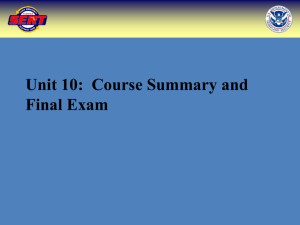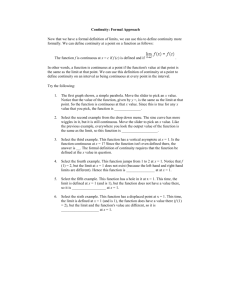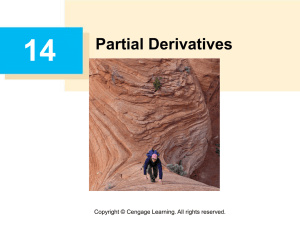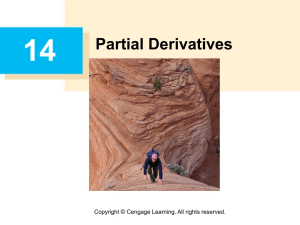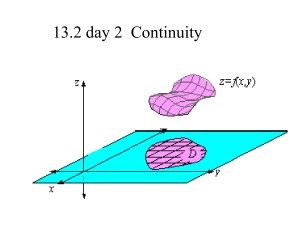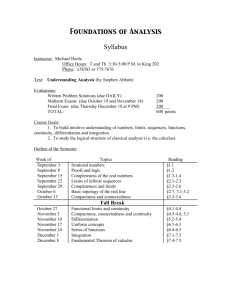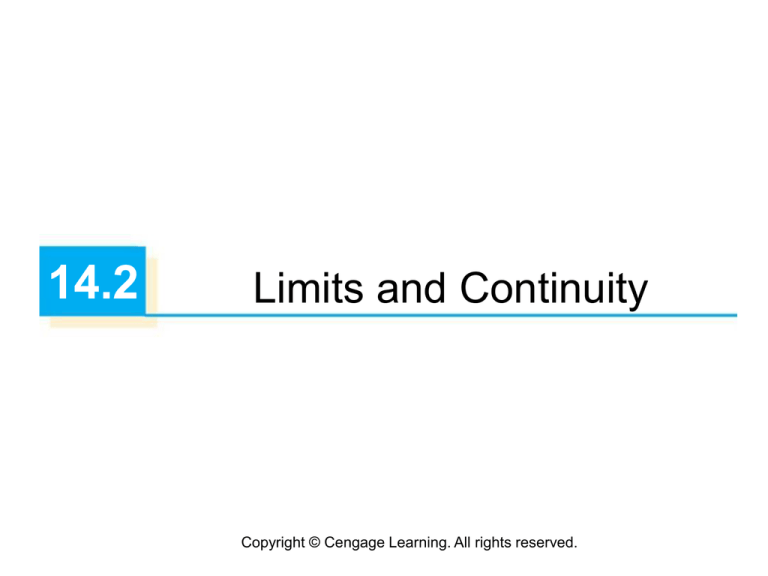
14.2
Limits and Continuity
Copyright © Cengage Learning. All rights reserved.
Limits and Continuity
In general, we use the notation
to indicate that the values of f(x, y) approach the number L
as the point (x, y) approaches the point (a, b) along any
path that stays within the domain of f.
2
Limits and Continuity
For functions of two variables the situation is not as simple
because we can let (x, y) approach (a, b) from an infinite
number of directions in any manner whatsoever
(see Figure 3) as long as (x, y) stays within the domain of f.
Figure 3
3
Limits and Continuity
Thus, if we can find two different paths of approach along
which the function f(x, y) has different limits, then it follows
that lim(x, y) (a, b) f(x, y) does not exist.
4
Example 1
Show that
does not exist.
Solution:
Let f(x, y) = (x2 – y2)/(x2 + y2).
First let’s approach (0, 0) along the x-axis.
Then y = 0 gives f(x, 0) = x2/x2 = 1 for all x 0, so
f(x, y) 1
as
(x, y) (0, 0) along the x-axis
5
Example 1 – Solution
cont’d
We now approach along the y-axis by putting x = 0.
for all y 0, so
Then
f(x, y) –1 as (x, y) (0, 0) along the y-axis
(See Figure 4.)
Figure 4
6
Example 1 – Solution
cont’d
Since f has two different limits along two different lines, the
given limit does not exist. (This confirms the conjecture we
made on the basis of numerical evidence at the beginning
of this section.)
7
Limits and Continuity
Now let’s look at limits that do exist. Just as for functions of
one variable, the calculation of limits for functions of two
variables can be greatly simplified by the use of properties
of limits.
The Limit Laws can be extended to functions of two
variables: The limit of a sum is the sum of the limits, the
limit of a product is the product of the limits, and so on.
In particular, the following equations are true.
The Squeeze Theorem also holds.
8
Continuity
9
Continuity
Recall that evaluating limits of continuous functions of a
single variable is easy.
It can be accomplished by direct substitution because the
defining property of a continuous function is
limxa f(x) = f(a).
Continuous functions of two variables are also defined by
the direct substitution property.
10
Continuity
A polynomial function of two variables (or polynomial,
for short) is a sum of terms of the form cxmyn, where c is a
constant and m and n are nonnegative integers.
A rational function is a ratio of polynomials.
For instance,
f(x, y) = x4 + 5x3y2 + 6xy4 – 7y + 6
is a polynomial, whereas
is a rational function.
11
Continuity
The limits in show that the functions
f(x, y) = x, g(x, y) = y, and h(x, y) = c are continuous.
Since any polynomial can be built up out of the simple
functions f, g, and h by multiplication and addition, it follows
that all polynomials are continuous on .
Likewise, any rational function is continuous on its domain
because it is a quotient of continuous functions.
12
Example 5
Evaluate
Solution:
Since f(x, y) = x2y3 – x3y2 + 3x + 2y is a polynomial, it is
continuous everywhere, so we can find the limit by direct
substitution:
(x2y3 – x3y2 + 3x + 2y) = 12 23 – 13 22 + 3 1
+22
= 11
13
Continuity
Just as for functions of one variable, composition is another
way of combining two continuous functions to get a third.
In fact, it can be shown that if f is a continuous function of
two variables and g is a continuous function of a single
variable that is defined on the range of f, then the
composite function h = g f defined by h(x, y) = g(f(x, y)) is
also a continuous function.
14
Functions of Three or More
Variables
15
Functions of Three or More Variables
Everything that we have done in this section can be
extended to functions of three or more variables.
The notation
means that the values of f(x, y, z) approach the number L
as the point (x, y, z) approaches the point (a, b, c) along
any path in the domain of f.
16
Functions of Three or More Variables
The function f is continuous at (a, b, c) if
For instance, the function
is a rational function of three variables and so is continuous
at every point in except where x2 + y2 + z2 = 1. In other
words, it is discontinuous on the sphere with center the
origin and radius 1.
17

